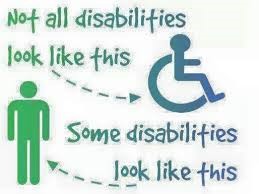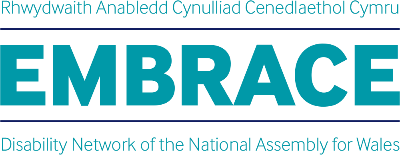 Image of person with shadow of a person in a wheelchair, with caption 'Not every disability is visible.'[/caption]
When people think of disabilities they think of someone in a wheelchair when in fact, according to the English federation of Disability Sport in 2014 there are only around 1.2 million wheelchair users in the UK, roughly 2% of UK population. The reality is a person doesn't always 'look' ill when they're dealing with a health issue. Despite popular belief the majority of impairments are not visible. Out of the millions of disabled people living in the UK, only a small percentage have illnesses that can actually be seen. These people are living with an invisible disability.
What is meant by invisible disability
[caption id="attachment_2023" align="alignleft" width="205"]
Image of person with shadow of a person in a wheelchair, with caption 'Not every disability is visible.'[/caption]
When people think of disabilities they think of someone in a wheelchair when in fact, according to the English federation of Disability Sport in 2014 there are only around 1.2 million wheelchair users in the UK, roughly 2% of UK population. The reality is a person doesn't always 'look' ill when they're dealing with a health issue. Despite popular belief the majority of impairments are not visible. Out of the millions of disabled people living in the UK, only a small percentage have illnesses that can actually be seen. These people are living with an invisible disability.
What is meant by invisible disability
[caption id="attachment_2023" align="alignleft" width="205"] Image of person and person in a wheelchair with caption 'Not all disabilities look like this. Some disabilities look like this.'[/caption]
Invisible disabilities refers to a wide range of conditions and illnesses that are not immediately apparent or visible, and therefore obvious. They include: cognitive dysfunctions; brain injuries; learning difficulties; epilepsy; cancer; diabetes, sickle cell, fibromyalgia; HIV; Aids; gastrointestinal problems; myalgic encephalopathy or myalgic encephalomyelitis (ME); mental health conditions, as well as hearing and visual impairments, to name a few. It is worth noting that someone who has a visible impairment or uses an assistive device such as a wheelchair, walker or cane can also have invisible disabilities, for example a person in a wheelchair may also have a mental health condition.
What are the challenges of living with an invisible disability
Like any disabled person a person living with an invisible disability faces stigma, exclusion and discrimination and the constant task of challenging misconceptions about their conditions. However, people with invisible disabilities may not always experience discrimination in the same way as someone with a noticeable disability. They can also face obstacles such as being accused of misusing accessible toilets, disabled parking spaces, and other facilities.
Image of person and person in a wheelchair with caption 'Not all disabilities look like this. Some disabilities look like this.'[/caption]
Invisible disabilities refers to a wide range of conditions and illnesses that are not immediately apparent or visible, and therefore obvious. They include: cognitive dysfunctions; brain injuries; learning difficulties; epilepsy; cancer; diabetes, sickle cell, fibromyalgia; HIV; Aids; gastrointestinal problems; myalgic encephalopathy or myalgic encephalomyelitis (ME); mental health conditions, as well as hearing and visual impairments, to name a few. It is worth noting that someone who has a visible impairment or uses an assistive device such as a wheelchair, walker or cane can also have invisible disabilities, for example a person in a wheelchair may also have a mental health condition.
What are the challenges of living with an invisible disability
Like any disabled person a person living with an invisible disability faces stigma, exclusion and discrimination and the constant task of challenging misconceptions about their conditions. However, people with invisible disabilities may not always experience discrimination in the same way as someone with a noticeable disability. They can also face obstacles such as being accused of misusing accessible toilets, disabled parking spaces, and other facilities.
"When somebody doesn't look ill, it's easy to make the assumption that they're lazy or mean or not thinking of others. But when I go to the accessible toilets it's because I have my ostomy bag and I do need a bit more space and running water." Sam Cleasby, Disability Campaigner
A person with an invisible disability has a right not to be made to explain their illness to a stranger. We need to understand that for many, using accessible toilets or disabled parking spaces is not a luxury or privilege. It’s a necessity in order for them to lead their lives. Those who judge are undoubtedly not doing it out of malice, but from a genuine desire to and belief that they're defending the rights of people who are genuinely in need. But even if that assumption comes from a place of kindness it is best not to make assumptions. You might think you're doing the right thing, but you could be making it worse for somebody already struggling. Invisible Disabilities and the National Assembly for Wales As an employer we recognise that, according to NOMIS’s Annual Population Survey March 2013, 20.8% of the working age population in the UK (8.3 million people) had a disability. We understand that encouraging applications from disabled people is good for business. It can help us to:- increase the number of high quality applicants available;
- create a workforce that reflects the diverse range of customers we serve and the community in which we are based, and
- bring additional skills to the business, such as the ability to use British Sign Language (BSL), which could result in large savings. The costs of making reasonable adjustments to accommodate disabled employees are often low. The benefits of retaining an experienced, skilled employee who has acquired an impairment are usually greater than recruiting and training new staff. It is also good for the individual.
- A range of facilities on site to ensure that we are an accessible organization: including a range of different toilet facilities such as gender neutral toilets, accessible toilets, a Changing Places facility with adult hoist, and toilets for people with mobility issues. To find out more about our accessible facilities, visit Euan’s Guide, the disabled access review website.
- Great policies, such as flexible working, including career break, part-time working, job share, term time working, condensed hours working and special leave.
[caption id="attachment_2045" align="alignright" width="127"]
 Positive about disabled people tick logo[/caption]
Positive about disabled people tick logo[/caption]
- Signed up to the ‘Positive about Disability’ scheme. A scheme that demonstrates to people that we are positive about employing and retaining disabled people. As part of the scheme we have committed to the two tick guaranteed interview scheme. Guarantying an interview to people with disabilities if they meet the essential requirements for the position.
- Workplace equality networks within the Assembly open to Assembly Commission staff, Assembly Members and their staff, including EMBRACE – our disability network. These networks provide: informal peer support and advice on diversity, inclusion and equality issues and share information related to equality; promote equality issues related to their group; enhance career development and progression for staff, including mentoring opportunities; and identify issues which affect staff, including advising the Assembly Commission on issues which affect staff through impact assessment of policies.
[caption id="attachment_2020" align="aligncenter" width="315"]
 Embrace disability network of the National Assembly for Wales logo[/caption]
Embrace disability network of the National Assembly for Wales logo[/caption] - Health, Safety and Wellbeing and Occupational Health teams, which offer a wide range of services to assist employees in managing their health and well-being. This includes assisting staff returning to work after periods of absence and counselling and support services through the Employee Assistance Programme.
- Not everyone with a disability uses a wheelchair or has a physical disability.
- Many people with invisible disabilities experience, on a daily basis, judgment over using facilities such as accessible toilets and disabled parking spaces, because people cannot see their illness. Don’t make assumptions and never be confrontational or aggressive.
- They don't and shouldn’t be made to explain themselves to strangers.
- With the right support many disabled people are able and willing to work.


